The EARN IT Act: How an anti-child exploitation law could cause more problems than it solves | fouroneone.consumersadvocate.org
EARN IT: The Anti-Child Trafficking Bill That’s Actually an Anti-Sex Work Bill | brokeassstuart.com
The Senate Might Pass a Bill That Could Eliminate Your Internet Privacy | betches.com
DSW Takes Action Against EARN IT
July 22, 2020
In our last newsletter, DSW reported on how the EARN IT Act, a bill that recently advanced out of the U.S. Senate Judiciary Committee, threatens the very heart of online security and privacy. The legislation claims to go after the online sexual abuse of minors. In a world that is quickly digitizing — and becoming even more dependent on internet security as the coronavirus pandemic forces businesses, healthcare facilities, schools, and other institutions to move online — the EARN IT Act is a sneak ban on encryption that, in reality, does not make anyone safer. Watch DSW’s animation on how the EARN IT Act, now on the Senate floor, would curtail end-to-end encryption and end internet privacy as we know it.
EARN IT would amend Section 230 of the Communications Decency Act, which protects online service providers from liability for content posted by their users. That immunity blocks most civil lawsuits and criminal charges under state law (except for sex trafficking) but maintains the tenants of federal regulations.
Under the EARN IT Act, the only way to maintain immunity is for the provider to comply with censorship “best practices” for fighting online sexual exploitation of minors. While this is a critical cause, these best practices would be developed by an “unelected, unaccountable 19-member commission headed by the attorney general, who would have the authority to approve or reject them,” according to Riana Pfefferkorn of the Stanford Center for Internet and Society. These guidelines would then bypass legally mandated deliberative processes to be quickly approved by congress.
Vulnerable people would be more at risk under the EARN IT Act’s mandates. Experts from Human Rights Watch, the ACLU, the Brookings Institution, and more charge that this legislation inappropriately goes after tech companies to solve a problem requiring a holistic social, policy, and enforcement solution. This approach would endanger the security of children, the rights of marginalized groups, and society in general.
DSW Newsletter #17 (August 2020)
Hero(es) of the Month: TS Candii, SX Noir, and Gizelle Marie Organize the Largest Sex Worker March in U.S. History
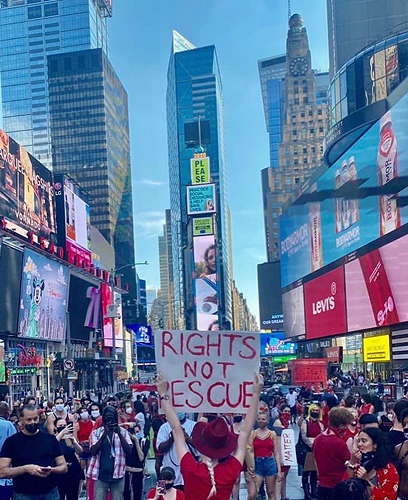
MA Democratic Senate Candidates Are Listening to Sex Workers

NY Senate Fails Trafficking Survivors, Again

DSW’s Kaytlin Bailey on Sex Work and Police Reform

DSW Takes Action Against EARN IT

The Stripper Strike Goes National


Hero(es) of the Month: TS Candii,...

MA Democratic Senate Candidates Are Listening...

NY Senate Fails Trafficking Survivors, Again

DSW’s Kaytlin Bailey on Sex Work...

DSW Takes Action Against EARN IT

The Stripper Strike Goes National
DSW Newsletter Archive
EARN IT Act Is a Wolf in Sheep’s Clothing
New animation shows how the EARN IT Act, now on the Senate floor, will curtail end-to-end encrypted messages, ending internet privacy as we know it.
NEW YORK, NEW YORK – July 22 – The Eliminating Abusive and Rampant Neglect of Interactive Technologies Act of 2020, also known as the EARN IT Act, by a unanimous vote of the Senate Judiciary Committee, has moved to the Senate floor. The bill was originally introduced by Republican Sen. Lindsey Graham of South Carolina. If this dangerous bill becomes law, it will end private communication on the internet.
The EARN IT Act is part of a long history of using sex panics to expand state power. If we fall for it this time we may effectively end freedom of expression and open communication on the internet as we know it. To raise awareness of this wolf in sheep’s clothing, Decriminalize Sex Work, a national advocacy organization, has released a new animated short:
EARN IT threatens website providers’ and other intermediaries’ ability to provide end-to-end encrypted services. End-to-end encryption is critical to ensuring private communication and often personal safety.
“Do voters really want the government snooping into their most private communication, with therapists, journalists, or intimate friends?” asks Kaytlin Bailey, Communications Director for Decriminalize Sex Work. “It’s easy to imagine how Trump’s DOJ will abuse these new surveillance tools to attack whistleblowers, protestors, and adult consensual sex workers.”
End-to-end encryption allows journalists to communicate about sensitive issues with sources, allows doctors to communicate with patients, and allows the average person to share sensitive financial information with trusted people. EARN IT can destroy all of this by exposing web platforms to an “enormous number of lawsuits in which they will potentially face liability for their choice to protect users’ privacy and security through end-to-end encryption (E2EE),” according to Emma Llansó with the Center for Democracy & Technology. “Prosecutors and civil litigants will point to the encrypted status of an intermediary’s services as a relevant consideration in their claims, even for criminal and civil provisions with a ‘knowingly’ mens rea. Even if an intermediary successfully defends against a particular claim, the consistent threat of litigation, and challenge to their decision to employ encryption, will be a strong disincentive against providing E2EE and continuing to have to defend that decision in court.”
“We can learn from the damaging consequences of the 2018 Allow States and Victims to Fight Online Sex Trafficking Act (FOSTA) and Stop Enabling Sex Traffickers Act (SESTA),” says Bailey. “Donald Trump signed FOSTA-SESTA into law in April of 2018 to devastating effects. Rather than protecting children and victims of sex trafficking, this set of laws has made sex work more dangerous.”
Llansó writes, “The clear lesson from the SESTA-FOSTA debacle: When content hosts, website operators, social media services, search engines, and other intermediaries face increased legal risk for user-generated content, it is the users who end up suffering, a cost often borne by the most vulnerable.”
Like so many of the save-the-children bills before it, EARN IT will not combat child sexual exploitation, but it will be the largest expansion of state surveillance powers in recent history, eliminating private communication on the internet.
Decriminalize Sex Work
Decriminalize Sex Work is a national organization pursuing a state-by-state strategy to end the prohibition of consensual, adult prostitution in the United States. We work with local organizations, advocates, and lobbyists to build community support and convince legislators to stop prostitution-related arrests. Evidence shows that decriminalizing sex work will help end human trafficking, improve public health, and promote community safety.
Kaytlin Bailey
Communications Director
512-942-6078 Ext 1
[email protected]
A New Bill Threatening Free Speech and Online Security Passes the U.S. Senate Judiciary Committee
July 2, 2020
An amended version of the EARN IT Act, a dangerous federal bill that could effectively erase private communication online, unanimously passed the U.S. Senate Judiciary Committee. The passage of the bill sets the stage for a high-stakes floor vote, one that could fundamentally endanger free speech and security on the internet.
Proposed by U.S. Sen. Lindsey Graham (R–SC), the law would establish an unelected, 19-member commission to develop guidelines on prohibited content for online platforms to follow. If companies fail to meet set standards, legal immunity for content posted by third parties, protected by Section 230 of the Communications Decency Act, could be revoked. The bill’s provisions also threaten encryption, which protects online users from exploitation and surveillance by the government, companies, and other users. EARN IT subjects companies using end-to-end encryption to lawsuits, construing encryption as “recklessly” enabling the spread of child trafficking online.
The result would increase pressure on websites to censor sexual content, causing sex workers to lose access to online safety provisions and networks, income, and clientele; and, in the case of COVID-19, leading to a heightened public health risk. Under SESTA/FOSTA, sex workers have been barred from online platforms where they previously screened clients, shared critical safety and health information, and ensured secure payment. Law enforcement has also reported that, since the passage of SESTA/FOSTA, they have lost evidence and leads for many of the sex trafficking cases they were investigating using online tips. The EARN IT Act will only augment these harms.
Multiple human rights organizations, including the American Civil Liberties Union and Human Rights Watch, have challenged the efficacy of the bill’s provisions. The ACLU issued a letter charging that the law would instead “undermine the privacy of every single American, stifle our ability to communicate freely online, and may jeopardize the very prosecutions it seeks to enable.”
“The EARN IT Act falsely suggests that we must choose between protecting children and protecting other fundamental rights, including privacy and free expression,” says Hye Jung Han, child rights and technology researcher at Human Rights Watch. “But the [bill] fails to protect children from online exploitation while undermining their fundamental rights to freedom of expression, access to information, and privacy — during today’s crisis and beyond.”
In a Cato Daily Podcast episode released in March of this year, Eric Goldman, a leading expert on internet law and intellectual property, described how the EARN IT Act removes web platforms’ immunity from being sued for content posted by third parties. Ostensibly an attempt to crack down on material that victimizes young people, Goldman doubts the legislation would achieve its targeted goal. Instead, the bill endangers free speech and the security of online users, particularly those posting sexual content.

U.S. Sen. Lindsey Graham proposed the legislation in March of this year. (Photo: Tasos Katopodis/The Verge, 2020)
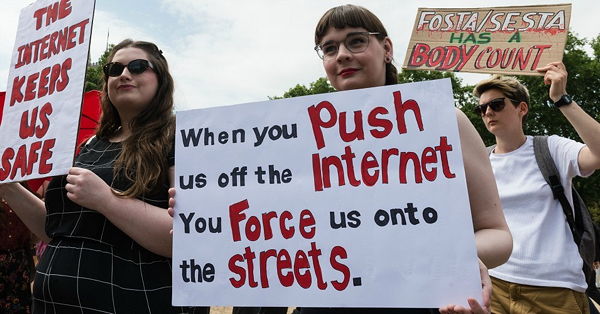
The same human rights experts and community activists who protested the passage of SESTA/FOSTA in 2018, including the ACLU, Human Rights Watch, and the Electronic Frontier Foundation, are speaking out against the EARN IT Act. (Photo: Wiktor Szymanowicz/Barcroft Media, 2020)

Eric Goldman is a professor at Santa Clara University School of Law where he co-directs the High Tech Law Institute and co-supervises the law school's Privacy Law Certificate. (Photo: Eric Goldman, 2020)
DSW Newsletter #16 (July 2020)
Hero of the Month: Portland-based stripper and sex worker rights activist Cat Hollis is demanding fair treatment for Black sex workers

A New Bill Threatening Free Speech and Online Security Passes the U.S. Senate Judiciary Committee

DSW Supports Criminal Justice Reform Bills in New York

A Victory Against Loitering Statutes in Seattle
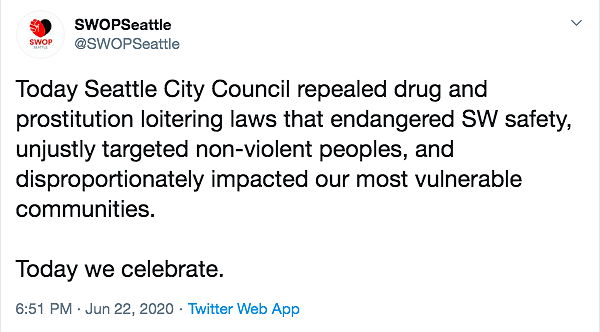
Fighting and Winning: Ceyenne Doroshow and the state of TGNCNB rights


Hero of the Month: Portland-based stripper...

A New Bill Threatening Free Speech...

DSW Supports Criminal Justice Reform Bills...
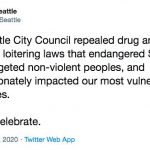
A Victory Against Loitering Statutes in...

Fighting and Winning: Ceyenne Doroshow and...
DSW Newsletter Archive
FOSTA/SESTA #2: The “EARN IT Act” Threatens the Rights and Safety of Online Communities
March 15, 2020
The Eliminating Abusive and Rampant Neglect of Interactive Technologies Act (EARN IT Act), was introduced by U.S. Sens. Lindsey Graham (R-SC) and Richard Blumenthal (D-CT). S. 3398 was then referred to the Senate Judiciary Committee. Similar to FOSTA/SESTA, EARN IT has been framed by proponents as an anti-trafficking bill. In practice, the legislation would do little to effectively combat online trafficking. Instead, the bill would threaten free speech and chip away at the constitutional protections outlined by Section 230 of the Communications Decency Act (CDA).
The bill would appoint a 19-person federal study commission to establish “best practices” around child pornography and trafficking. We do not yet know precisely what these practices would be or how they would impact our community. Anti-trafficking regulations in the U.S. have historically been ineffective at combating sexual exploitation. As was the case with the End Banking for Human Traffickers Act of 2018, mandatory trafficking “red flag” trainings for hospitality and transportation workers in 2017, and most recently, FOSTA/SESTA in 2018, these policies criminalize everyday actions, impose unconstitutional surveillance, and endanger the safety of marginalized people by blocking their access to critical resources. Encouraging discrimination and conflating consensual behavior with trafficking only makes exploitation harder to detect where and when it occurs.
The jurisdiction of the commission created by EARN IT is unconstitutionally vague and overly broad. The legislative intent is to eliminate sexual material concerning minors online; the language of the bill does not restrict the commission’s oversight to those matters. The legislation does not explicitly state the goal of ending encryption, but Attorney General William Barr, who would head the commission, has indicated his desire to do so.
Additionally, the requirements the legislation imposes on platforms do not take into account collateral consequences or harm reduction efforts. Instead, the financial incentives of companies and competition will drive decision making. Platforms do not have any stake in protecting performers’ personal information if it conflicts with protecting themselves from liability.
Like SESTA, this bill could facilitate the conviction of sex workers for crimes unrelated to human trafficking. Surveillance and red flags would not be limited to sexual content that seems violent or abusive. Platforms would be forced to expand the material they monitor or risk facing prosecution. Sex workers will lose even more of their ability to communicate safely, organize away from abusers, screen clients, and maintain anonymity in the workplace. EARN IT also curtails sexual education and access to sexual harm-reduction resources, endangering public health and sexual autonomy.
Many tech companies and human rights organizations have vocally opposed the legislation. The popular encrypted messaging app, Signal, has pledged to leave U.S. markets if EARN IT passes. For more information, read the Electronic Frontier Foundation’s article on constitutional challenges to the legislation. Please consider reaching out to your two U.S. senators to express concern over the unintended consequences that EARN IT poses. We must oppose this harmful and unconstitutional bill.

Sen. Graham talks with reporters in the U.S. Capitol on March 3. (Photo: Tom Williams/CQ-Roll Call, Inc via Getty Images)

The popular encrypted messaging app, Signal, has said it will leave U.S. markets if the “EARN IT Act” passes. (Photo: Yefei Fang via Wired, 2020).
DSW Newsletter #13 (April 2020)
Hero of the New York Transgender Community Passes Away From COVID

Co-Working From a Social Distance
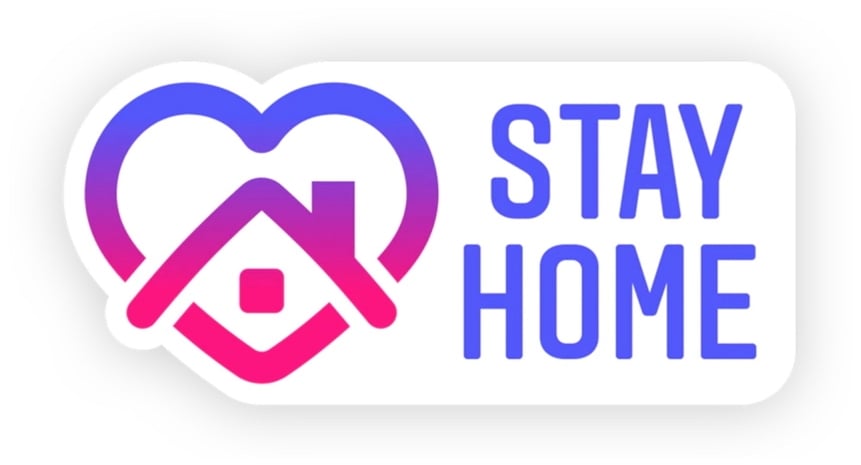
Dangerous Bail Reform Rollbacks Pass in the NYS Budget Amidst Pandemic Crisis

FOSTA/SESTA #2: The “EARN IT Act” Threatens the Rights and Safety of Online Communities

DSW and Allies Publish COVID Guide
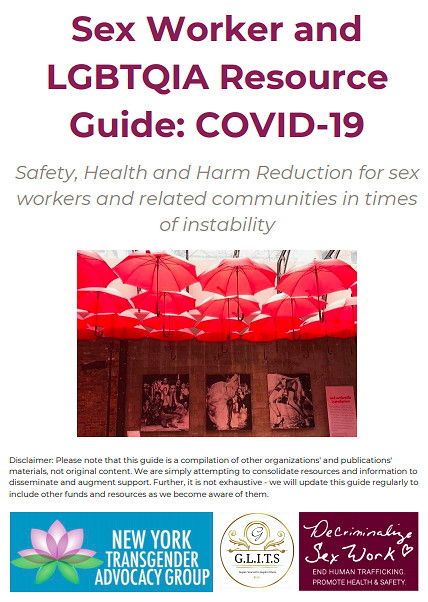

Hero of the New York Transgender...

Co-Working From a Social Distance

Dangerous Bail Reform Rollbacks Pass in...

FOSTA/SESTA #2: The “EARN IT Act”...

DSW and Allies Publish COVID Guide
